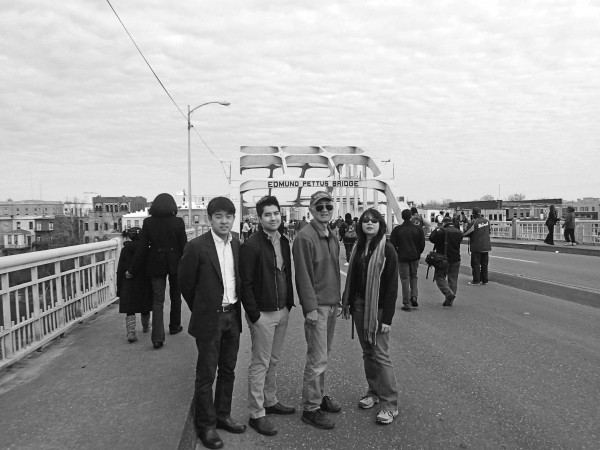(From left) Kota Mizutani, Ryan Kuramitsu, Todd Endo and Korinne Sugasawara in Selma, Ala.
In case you missed it, JACL representatives were in Selma last month to commemorate the 50th anniversary of the 1965 Voting Rights Marches. Under the leadership of Dr. Martin Luther King Jr., the Selma marches were in protest of continued institutional barriers to voting registration despite the passage of the Voting Rights Act.
There was much to contemplate and discuss during the weekend’s events, but perhaps the most significant questions on our minds were, “Are things actually better now? Have we actually made racial progress or was the blood, sweat and tears of Selma movement leaders and foot soldiers in vain?”
From the foot of the infamous Edmund Pettus Bridge, President Barack Obama sought to answer these questions in a harrowing speech regarding the importance of the Voting Rights Marches in 1965. He noted that despite the many parallels between civil rights injustices of today and the brutality faced by protesters 50 years ago, the United States has made significant strides to eliminate institutional racism and discrimination.
On this specific point, I would have to agree with the president. Indeed, though Voter ID laws today are a significant breach of civil rights yet to be tackled, our society has come far in confronting discrimination in our legal codes. Social justice activists and leaders have achieved remarkable victories over segregationists and discriminatory statutes.
Yet to me, President Obama’s true answer to this complex question of progress or regress did not lie in that section of his speech. The most critical analysis of how our society has not changed came during this segment:
“As we commemorate [the Voting Rights March protesters’] achievement, we are well-served to remember that at the time of the marches, many in power condemned rather than praised them. Back then, they were called Communists, half-breeds, outside agitators, sexual and moral degenerates, and worse — everything but the name their parents gave them. Their faith was questioned. Their lives were threatened. Their patriotism was challenged.”
We are well-served to remember, indeed. The core impact of the president’s argument here is that in 1965, the protests, demonstrations and expressions of anger and frustration by the black community was seen as unjustified. To strong segregationists 50 years ago, the protests were a challenge to societal norms and white supremacy. To a large number of neo-liberals, the protests were unnecessarily aggressive. Even to some well-to-do blacks, the disruptive nature of the protests was seen as “counterproductive.” By the standards of equality of that time, the protesters were disrupting the peace and undoing justice.
Retrospectively, however, they were changing — and, hopefully, we can call agree that they were improving — the meaning of “justice” to be what we interpret justice to mean today.
Though perhaps seemingly inconsequential (“Of course people back then didn’t like what the civil rights activists were doing!), the impacts of this observation are immense and often ignored in discussions on race and protest today. First, justice as defined by law should not be based on predetermined or “traditional” normative standards or interpretations. Second, adapting and changing our interpretations of justice inherently requires the disruption and conscious departure from status quo understandings of justice as defined by law.
Unfortunately, it appears that society has yet to fully grasp this concept. A day after President Obama spoke, out-going Attorney General Eric Holder took the podium at the historic Brown Chapel in Selma and delivered some of the commemoration’s most powerful words. During his speech, Holder noticeably repeated two crucial phrases pointing to the parallels of minority marginalization during the 1960s and minority marginalization today: “Paying for the necessary documents to vote” and “An unarmed young black man.” The former statement references the striking similarity between poll taxes in the 1960s and Voter ID laws today, while the latter mirrors the death of Jimmie Lee Jackson, an unarmed black man killed by Alabama police, with recent killings of unarmed black men by police.
There are many who would eagerly point out the major differences between the catalyzing events and circumstances of the 1960s and today. These arguments, decrying current protests and movements as “unnecessarily aggressive,” “unproductive” and “unjustified,” echoes the same mind-set that opposed civil rights activism 50 years ago.
Ultimately, the answer to our overall questions is that while our country has made great strides in combatting racism and discrimination, we are becoming increasingly complacent with norms of justice that may not, in fact, be just. We must remember to challenge accepted understandings of morality in our search for equality.
Kota Mizutani is a sophomore studying political science and ethnic studies at Brown University. He currently serves as the EDC Youth Representative and Treasurer for the National Youth/Student Council.





